Key takeaways:
- Adaptability and teamwork are essential in overcoming festival challenges, such as unexpected weather and vendor coordination.
- A proactive mindset enables effective problem-solving and fosters collaboration, turning challenges into opportunities.
- Celebrating small victories builds team morale and encourages a culture of recognition, driving further motivation and success.
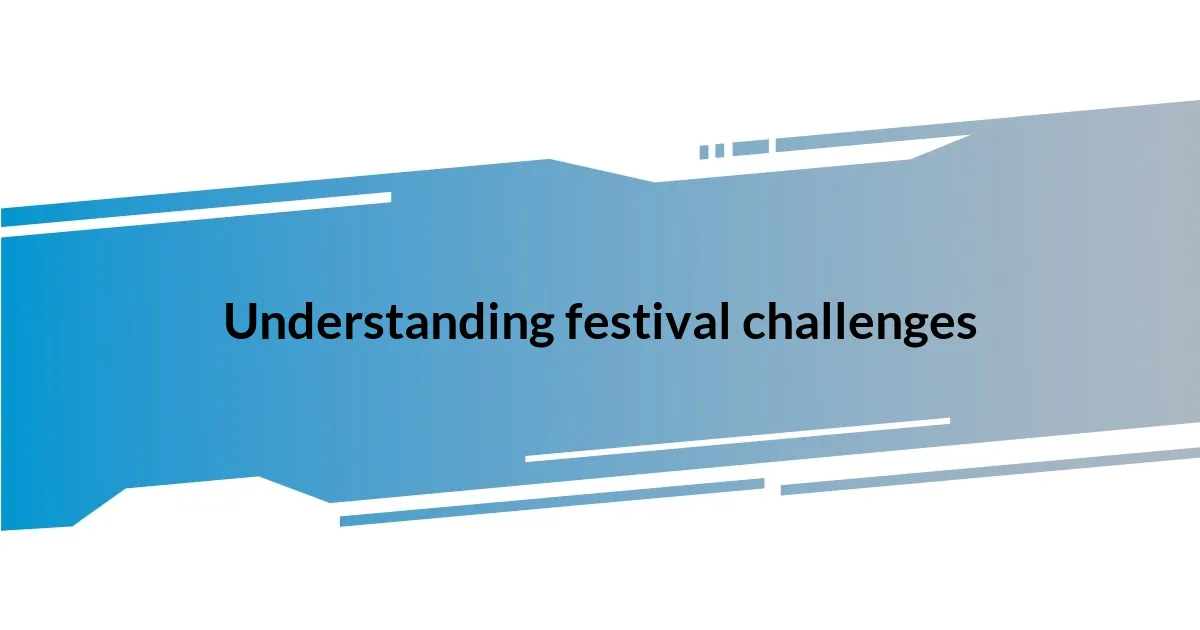
Understanding festival challenges
Festivals are such vibrant experiences, but they come with a unique set of challenges that can sometimes feel overwhelming. For instance, when I volunteered at a music festival, I faced unexpected weather changes that sent us scrambling to protect equipment. Have you ever found yourself unprepared for a sudden downpour? It’s in those moments that I learned adaptability is essential.
Another challenge I encountered was coordinating various vendors and ensuring everything ran smoothly. I remember standing in the middle of chaos as food trucks delayed their arrival and sound checks overlapped. It made me wonder, how can we effectively manage competing priorities in high-stress environments? In my experience, clear communication and teamwork became indispensable tools that not only resolved the issues but also forged stronger relationships.
Moreover, the financial strain of organizing a festival can weigh heavily on decision-making processes. I once witnessed a team debate whether to cut certain activities to save costs while still aiming to provide a memorable experience. It left me thinking: what sacrifices are we willing to make for the sake of quality? This dilemma pushed everyone to brainstorm creative alternatives, turning financial limitations into an opportunity to innovate and explore new ideas.
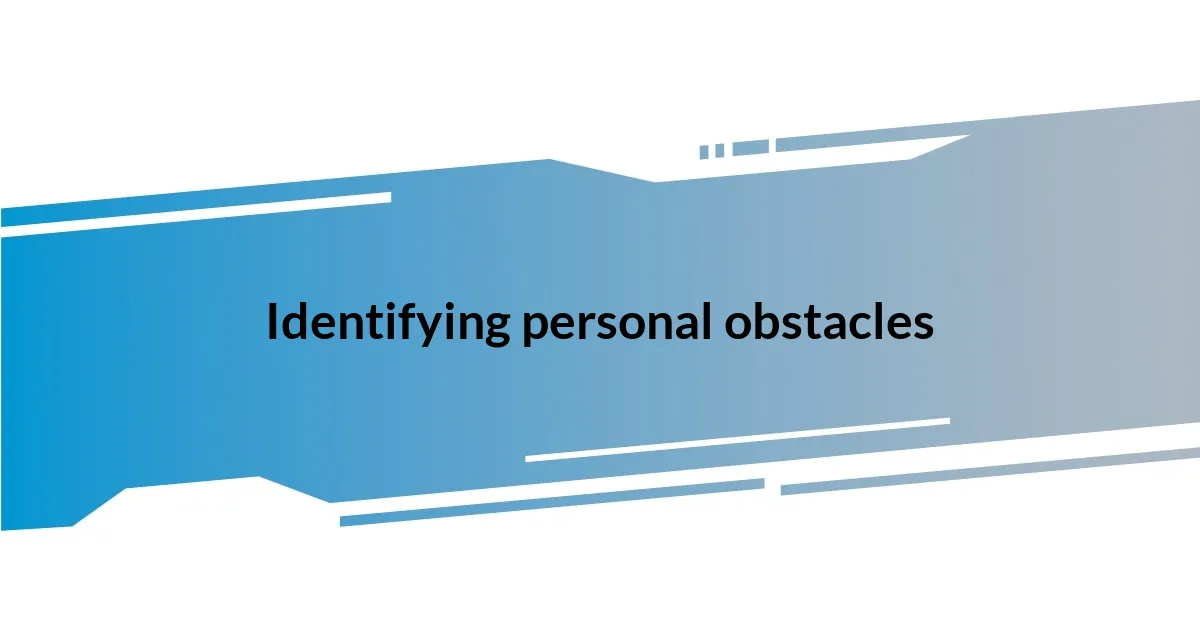
Identifying personal obstacles
Identifying personal obstacles is crucial in discovering how to transform challenges into opportunities. For example, during a festival, I often found my own time management skills tested when juggling multiple responsibilities. I vividly recall a moment when I had only fifteen minutes to resolve a technical glitch while simultaneously keeping an eye on the schedule. It was a true test of my ability to prioritize, but that experience taught me the importance of staying calm under pressure.
Another significant obstacle I faced was my hesitation to delegate tasks. In one instance, I tried to handle far too much on my own, leading to feelings of stress and overwhelm. Reflecting on that, I realized that teamwork not only lightens the load but also fosters creativity. Allowing others to contribute their strengths not only enhances the experience but also opens up opportunities for collaboration and innovation.
Lastly, I noticed my tendency to shy away from networking at festivals. Initially, I felt intimidated when engaging with industry professionals. However, pushing myself to step out of my comfort zone changed everything. I found that each conversation was a chance for growth, expanding my horizons and enabling me to uncover hidden opportunities I was previously unaware of.
| Obstacle | Personal Insight |
|---|---|
| Time Management | Quick thinking is key; prioritize tasks wisely. |
| Delegation | Trusting others can lead to amazing teamwork. |
| Networking | Engaging with others opens doors to new opportunities. |
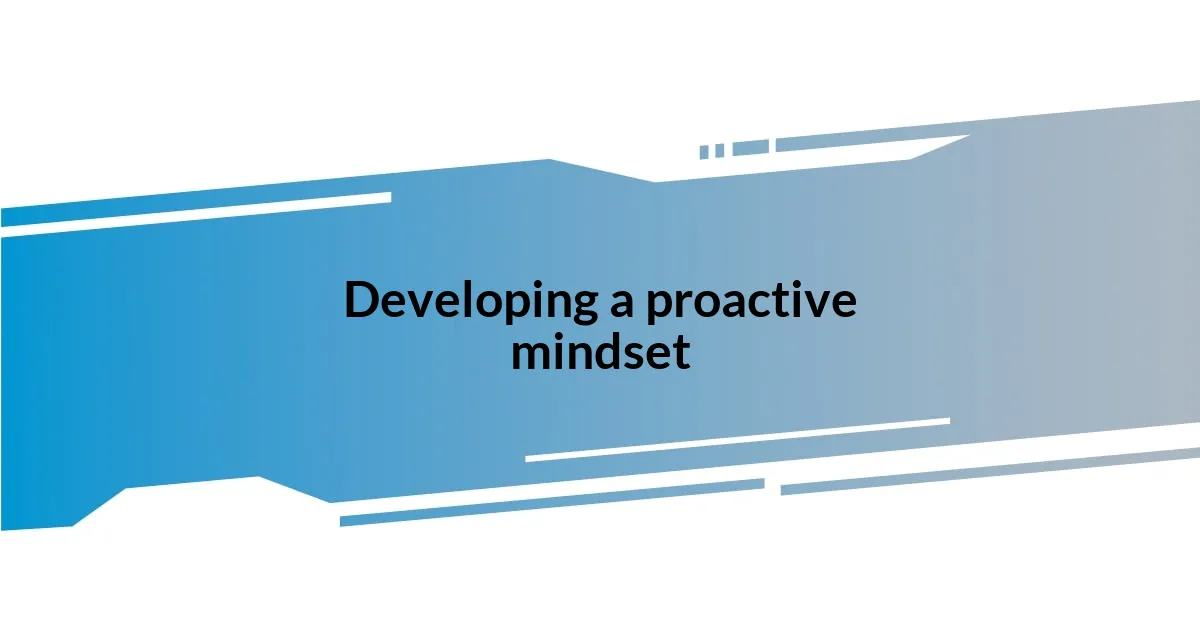
Developing a proactive mindset
Developing a proactive mindset has been a game-changer for me, especially in high-pressure festival environments. I recall a moment when a scheduling conflict arose just hours before a major performance. Instead of panicking, I decided to take charge and create a quick contingency plan. I learned that a proactive approach not only alleviated stress but also empowered my team to act swiftly and decisively. Embracing this mindset transformed how I faced obstacles.
Here are some ways I’ve cultivated a proactive mindset:
- Anticipate Problems: I always try to foresee potential challenges, allowing me to prepare solutions in advance.
- Stay Positive: I remind myself that every setback is a setup for a comeback. Focusing on opportunities helps me stay motivated.
- Seek Feedback: Actively asking for input from my peers has given me insights that I might have missed otherwise.
- Practice Resilience: I take small failures as lessons to strengthen my approach to future challenges.
When I reflect on my proactive mindset, I realize it’s about shifting from a reactive stance to one where I take initiative. One instance that stands out is when a last-minute vendor cancellation threatened to derail our food experience. Instead of assuming the worst, I reached out to local businesses, and we were able to create an even more diverse menu. This experience drove home the idea that challenges often hide wonderful opportunities; I just had to be willing to look for them.
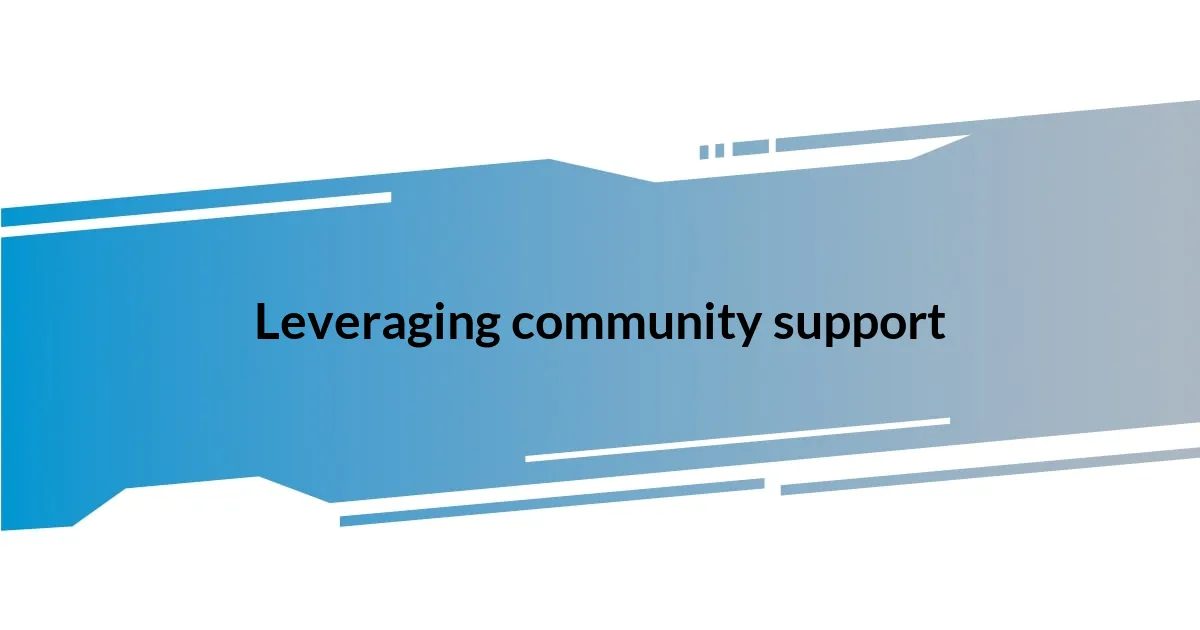
Leveraging community support
When I think about community support, I can’t help but recall the incredible volunteers I encountered at a festival I organized. One year, we faced a major logistical issue that threatened to impact our setup time. Instead of panicking, I reached out to the local community through social media, asking for help. In less than an hour, a group of enthusiastic locals showed up, ready to lend a hand. This kind of solidarity not only saved the day but also strengthened our ties and fostered a sense of belonging among everyone involved. Have you ever noticed how a simple call for help can turn strangers into friends?
The impact of community support extends far beyond immediate assistance. After that festival, I realized that establishing connections within the community opens a wealth of opportunities for collaboration. For instance, I began partnering with local artists to enhance our event’s experience. Their unique talents and perspectives not only enriched our programming but also showcased the vibrant culture of our area. It affirmed my belief that involving others creates a shared investment in the success of the festival—something truly magical happens when we uplift each other.
I also learned that community involvement promotes a sense of accountability. Sharing my challenges with fellow organizers not only provided fresh ideas but also encouraged me to stay committed to my goals. I vividly remember an early-morning meeting where I laid out my struggles with budgeting. The honest feedback and creative solutions from my peers made me feel supported. It got me thinking: how often do we let fear of failure isolate us when, in truth, we’re surrounded by potential allies? Embracing community support reminded me that we’re stronger together, and that’s a lesson I carry with me in all my endeavors.
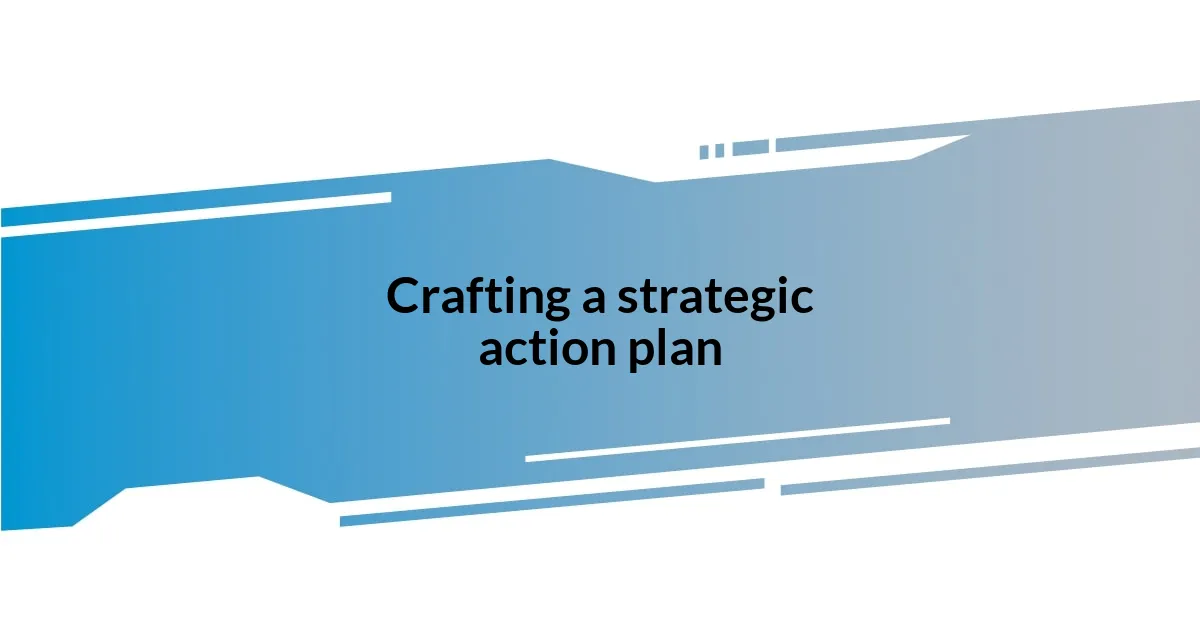
Crafting a strategic action plan
Crafting a strategic action plan requires a clear vision and a flexible framework. I vividly remember a frantic moment during one festival when unexpected weather warnings jeopardized our outdoor stage. I gathered my team and we brainstormed alternative setups and backup locations, transforming chaos into structured options. This experience taught me how crucial it is to have a dynamic plan that can adapt to the unforeseen.
When I create a strategic action plan, I break down the larger goals into manageable tasks. It’s like building a puzzle—each piece must fit harmoniously with the others. For example, I once organized a schedule that included buffer times between performances, anticipating potential delays or technical issues. This strategy not only kept our event running smoothly but also gave everyone involved a sense of security. How often do we overlook the importance of planning for unpredictability? It’s a lesson learned from experience that has improved my event management drastically.
In addition, I find it essential to involve my team in the planning process. After all, diverse viewpoints can lead to innovative solutions. I recall a planning session where one of my team members proposed using a mobile app for real-time updates. Embracing that idea not only streamlined communication but also embraced technology in a way that connected our audience to the event seamlessly. I often ask myself: what more could I achieve if I openly welcomed collaborative input from my team? Each endeavor reinforces the belief that a well-crafted action plan empowers everyone to shine together.
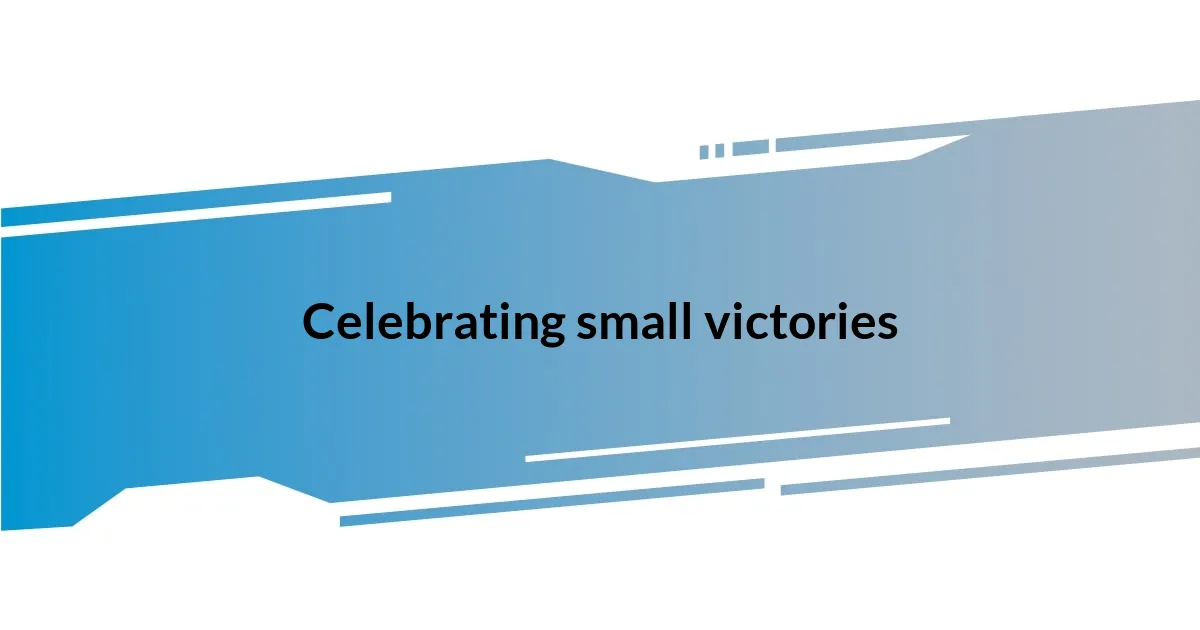
Celebrating small victories
I’ve learned that celebrating small victories can significantly boost morale, especially during hectic festival planning. For instance, after securing a local sponsor, I gathered my team for a quick celebratory coffee break. It was such a simple gesture, yet it ignited a sense of accomplishment and reminded everyone of our shared purpose. In those moments, I often wonder—how many times do we forget to acknowledge the small wins that pave the way for bigger milestones?
Every small victory deserves recognition, no matter how minor it may seem. I once organized a workshop where we successfully engaged just a handful of attendees, but to me, it felt monumental. That small group brought such positive energy, and we ended up having fantastic discussions that sparked creativity. Reflecting on this experience, I realize it’s essential to recognize the impact of these smaller steps. It’s in those small victories where we build confidence and character, allowing us to tackle more considerable challenges down the road.
Additionally, celebrating those little achievements fosters a culture of encouragement within our team. After every event, I make it a point to share a highlight reel of our successes, no matter how small—like nailing the soundcheck or receiving positive feedback from attendees. These reminders have forged deeper connections among team members, turning a group of individuals into a united force. It’s interesting to think—how can a simple act of celebration transform a team dynamic and inspire even more effort? I firmly believe these moments of recognition not only validate our hard work but also motivate us to push further together.
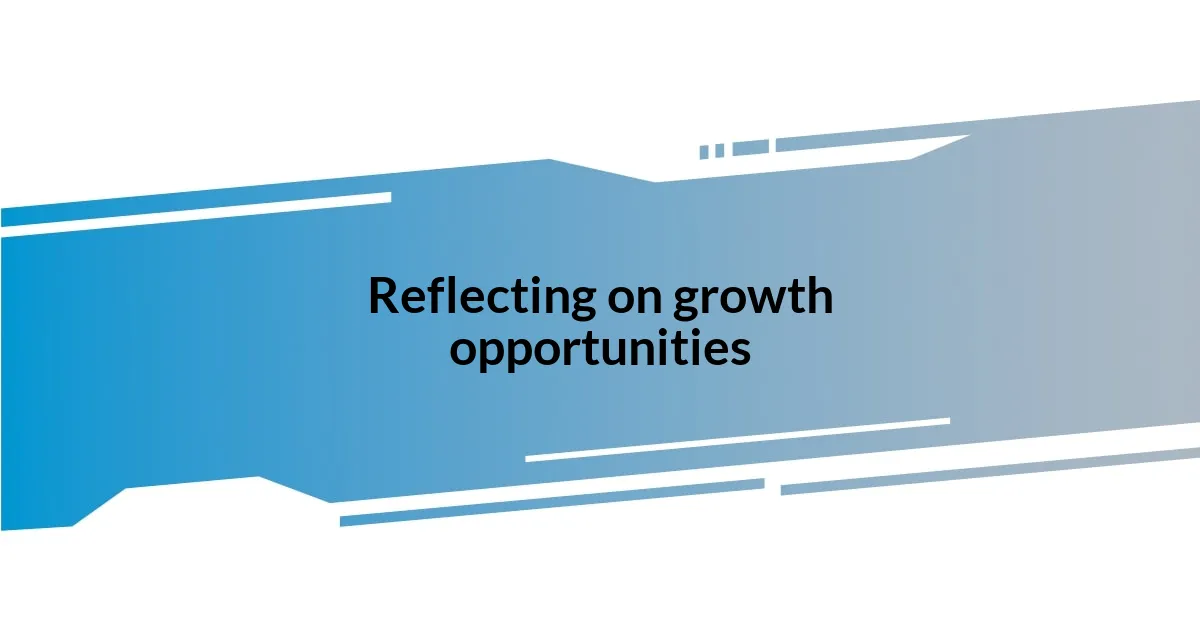
Reflecting on growth opportunities
Reflecting on growth opportunities often reveals the layers of resilience we’ve built over time. I recall a particularly challenging festival where we faced a sudden shortage of volunteers just days before the event. Instead of spiraling into panic, I viewed this as a chance to connect with our community. I reached out on social media and rallied support, ultimately bringing in new faces who not only filled the gaps but also infused fresh energy into our team. Isn’t it fascinating how adversity can sometimes cultivate connection and growth?
It’s crucial to examine each challenge as a learning moment. I think about a year when our ticket sales initially flatlined, leaving us unsure of the event’s viability. Rather than feeling disheartened, I initiated a feedback loop with potential attendees to understand their hesitations. This openness led us to implement changes that not only boosted sales but also deepened our understanding of our audience. How often do we miss the opportunity to learn from our setbacks? It’s a reminder that every dip in fortune could prompt an insightful shift towards improvement.
Moreover, embracing vulnerability in these situations can lead to profound growth. I remember standing in front of my team after a mishap during a major event, admitting my oversight in planning. What struck me was the shift in energy—everyone rallied together with renewed purpose and ideas to prevent a repeat. It dawned on me that acknowledging our missteps is not a weakness but a catalyst for collective strength. Have you ever noticed how honesty cultivates trust and innovation? It’s an incredible revelation that shapes how I approach challenges today.
